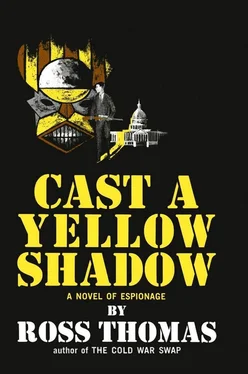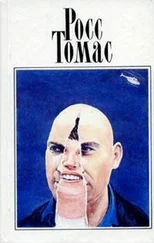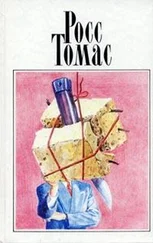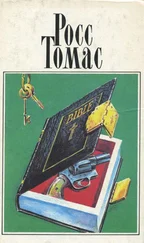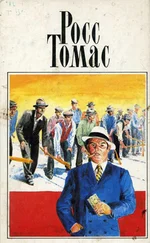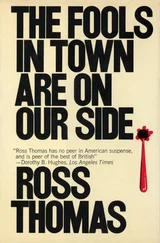Iker set the glass down carefully on the coffee table. “You don’t seem to care much for the FBI, Mr. Padillo.”
“Is that one of the questions you have to ask me?”
“No,” Iker said. “It’s just a comment.”
“You’ve been out of the country a long time,” Weinriter said.
“More than ten years.”
“You arrived here yesterday?”
“Yes.”
“Where did you enter the country, Mr. Padillo?”
“Baltimore.”
“You arrived by plane or ship?”
“Ship.”
“Which one?”
There was another knock at the door. This time I got it and it was the room-service man with breakfast. He wheeled the tray in briskly and had a cheery good morning for us all. “Told me there were only going to be two of you. Just two. But I brought cups for four. I always do. It’ll be just a moment now.” He snapped the leaves of the wheeled table into place, reached underneath and brought out the portable warming oven.
“Everybody wants coffee right now, I bet.” He was a short, bustling man with a rogue’s eyes and a leprechaun’s mouth. The mouth seemed to have an endless supply of chatter. He put four cups on the table and filled them. He put spoons in the saucers. “Coffee coming up, gentlemen. Nothing like a good cup to begin the day. Here you are, sir,” he said to Iker. Iker accepted the cup and looked as if he had compromised the Bureau. Weinriter got the next cup and the third and fourth went to Padillo and me. The waiter served sugar and cream. Padillo took cream; I accepted sugar. Iker and Weinriter were of sterner stuff and drank theirs black.
The room-service waiter bustled around some more, spooning the scrambled eggs and bacon onto plates, making sure the butter was cold, hard and unspreadable in its bed of ice, and that the toast was cool enough to eat. Then he presented the check with a flourish to Weinriter who looked embarrassed for a moment until I said, “The gentlemen over there will sign for it.” The waiter almost trotted over to Padillo who signed the check.
“You need anything else, you just call me, number forty-two,” said the waiter.
“You have a name?” Padillo asked.
“I’m Al, sir.”
“If we need anything, we’ll call you, Al.”
“Thank you, sir.”
I rose and walked over to the table on wheels. “You don’t mind if we go ahead?” I said to Iker and Weinriter. They shook their heads to indicate that they didn’t mind. Padillo sat across the table from me. He put some cold butter on his cool toast. I tried the eggs. They were quite good.
“Which ship, Mr. Padillo?”
“The Frances Jane .”
“Were you a passenger?”
“Yes.”
“You weren’t on the passenger list.”
“I was traveling incognito. Look under Billy Joe Thompson.”
“May I see your passport?” Iker said.
Padillo picked up a piece of bacon, took a bite, and chewed it slowly. Then he took a sip of coffee. “I don’t have one.”
“How did you get on the ship without a passport?”
“They didn’t ask me for one. The Frances Jane is no cruise liner, friend. It’s a tramp.”
“What happened to your passport, Mr. Padillo?”
“I lost it.”
“Have you reported the loss to the State Department?”
“No. I didn’t think they would be interested.”
Weinriter tried some sarcasm. I felt sorry for him. “I think the State Department might be just a little interested in the loss of your passport, Mr. Padillo.”
After he borrowed a cigarette from me Padillo leaned back in the chair and looked at Iker and Weinriter. He took his time. “If you want to report the loss of a passport with the name Michael Padillo on it to the State Department, go ahead. They’ll have no record of it ever being issued. If I needed a passport, there’s an outfit in Detroit that would provide one in twenty-four hours along with a brand new driver’s license, a registration card, and a social security number that would check out just fine on the big computer in Baltimore. But you probably know all this and if you do, then you also know that my attorneys in Bonn have filed income tax returns for me for the last ten years and if you have any questions about those, you’ll have to get in touch with them. Now is there anything else?”
“Whom do you work for, Mr. Padillo?” Weinriter said.
“For myself. I help run a bar and restaurant.”
“That’s not what I mean.”
“Then try it again.”
“Who sent you to Africa?”
“I was on vacation. It took my life’s savings, but it was worth it.”
“We have different information.”
“Hang on to it.”
“It says you were selling arms.”
“It’s wrong.”
“It’s a serious charge, Mr. Padillo. You seem to think it’s a joke.”
“It’s not very serious or you wouldn’t be sitting here just mumbling about it. You’d have a Federal warrant and I’d be on my way downtown. You don’t have a warrant and I suspect you’re working somebody else’s territory and if they find out about it, they’ll get all nervous and worked up and indignant again.”
“You mean?” I said as they used to say it on radio about three o’clock in the afternoon.
“The very same, Inspector,” Padillo said. “The notorious CIA.”
“That puts an entirely different light on the matter, doesn’t it, Reggie?” I said.
“You two are very funny,” Iker said. “You’re also a waste of time. We know about you, Padillo, and we know about your partner here. You’re right. There is a file on both of you. A thick one.” He stood up. Weinriter joined him. “I have the feeling that it’s going to get a lot thicker.”
They moved towards the door. Just as they had it open, Padillo said, “You forgot the evidence.” He tossed the water glass with the fingerprints. Iker used his reflexes again and fielded it nicely. He looked at it, looked at Padillo, and shook his head. He put the glass down on a table. “You two are very funny,” he said again.
When they left they closed the door quietly behind them.
“What brought that on?” I asked.
“The hotel probably had instructions to call as soon as I made an appearance,” Padillo said. “They just dropped by to make sure it was me. They’ll be back from time to time.”
“That casual visit could get Fredl killed.”
“I doubt it. They’re trained not to be spotted, but we can do without the social calls. We’ll move fast now.”
He walked over to the telephone and dialed a number. When it answered he spoke rapidly in Spanish. He was going far too quickly for me, but I could tell that he was speaking a classy Castillian. The conversation lasted about three minutes. Padillo hung up the phone and turned to me.
“We have an appointment in half an hour.”
“Is this the woman who likes her visitors all spruced up?”
He nodded. “She’s growing old, but she likes nice things. Money’s about the nicest thing she knows.”
“This one’s going to cost, I take it?”
Padillo shook his head. “I don’t think so. I think she’ll do it for sentiment. She was in love with my old man once, a long time ago.”
“In Spain?”
He nodded. “When he got killed in Madrid, she made arrangements to get my mother and me to Portugal and then to Mexico City.” Padillo’s mother had been a beauty from Estonia who had married a Spanish attorney. The attorney had been shot by the winners in 1937. Mother and son had gone to Mexico where she had supported them by giving piano and language lessons. She taught Padillo to speak six or seven languages perfectly before she died of tuberculosis in the early 1940’s. I don’t think he could play the piano. He had told me all this a long time ago in Bonn when we first met. It was this unique fluency with languages that had drawn him to the attention of the U.S. spy crowd.
Читать дальше
